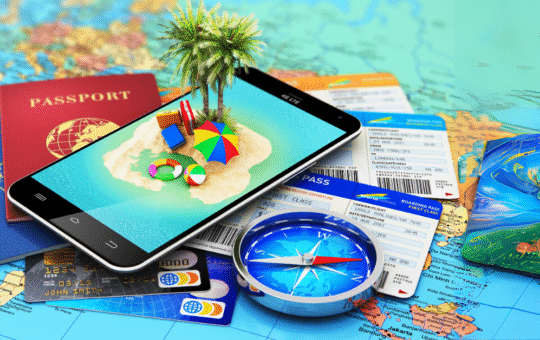
Level 3 Certificate in Travel and Tourism Management
- Gain a deeper understanding of the travel and tourism industry's operational, strategic, and managerial aspects.
- Learn how to effectively manage travel operations, customer experiences, and business logistics.
- Explore marketing strategies specific to the travel and tourism industry.
- Develop skills in leadership, communication, and business management.
- Enhance employability and prepare for roles in travel agencies, tour operators, airlines, and tourism boards.
- Understand the key concepts in travel and tourism management.
- Learn about managing customer expectations and delivering high-quality service in tourism settings.
- Develop practical skills in marketing, sales, and promotions within the travel industry.
- Gain knowledge of international travel regulations and destination management.
- Understand the financial and operational aspects of managing a tourism business.
- Introduction to Travel and Tourism Management
- Overview of the global travel and tourism industry.
- Key sectors: airlines, travel agencies, tour operators, hotels, and cruise lines.
- Managing Customer Experiences
- Developing customer service strategies for tourism.
- Managing complaints, enhancing customer satisfaction, and building loyalty.
- Marketing in Travel and Tourism
- Principles of marketing and sales within the tourism industry.
- Promotion strategies, digital marketing, and customer segmentation.
- Tourism Business Operations
- Understanding the operational aspects of managing a tourism business.
- Financial management, resource allocation, and business growth strategies.
- Sustainable Tourism and Destination Management
- The concept of sustainable tourism and its importance in modern travel.
- How to manage tourism destinations while minimizing environmental and cultural impact.
- Move into management positions in travel agencies, airlines, tour operators, or tourism boards.
- Pursue higher education or certification in travel management, hospitality, or tourism marketing.
- Work as a destination manager, tour leader, or travel consultant.
- Comprehensive Curriculum: Learn everything from customer service to business management in tourism.
- Expert Trainers: Learn from experienced professionals who have worked in the travel and tourism industry.
- Practical Focus: Apply your knowledge to real-world scenarios and case studies.
- Globally Recognized Certification: Boost your career with an internationally recognized qualification in travel and tourism.
Study Units
- Introduction to Travel and Tourism Management
- Overview of the global travel and tourism industry.
- Key sectors: airlines, travel agencies, tour operators, hotels, and cruise lines.
- Managing Customer Experiences
- Developing customer service strategies for tourism.
- Managing complaints, enhancing customer satisfaction, and building loyalty.
- Marketing in Travel and Tourism
- Principles of marketing and sales within the tourism industry.
- Promotion strategies, digital marketing, and customer segmentation.
- Tourism Business Operations
- Understanding the operational aspects of managing a tourism business.
- Financial management, resource allocation, and business growth strategies.
- Sustainable Tourism and Destination Management
- The concept of sustainable tourism and its importance in modern travel.
- How to manage tourism destinations while minimizing environmental and cultural impact.
By completing this course, learners will:
- Understand the key concepts in travel and tourism management.
- Learn about managing customer expectations and delivering high-quality service in tourism settings.
- Develop practical skills in marketing, sales, and promotions within the travel industry.
- Gain knowledge of international travel regulations and destination management.
- Understand the financial and operational aspects of managing a tourism business.
The Level 3 Certificate in Travel and Tourism Management is ideal for individuals who are passionate about building a career in the vibrant travel and tourism industry. It is designed for:
Aspiring Travel and Tourism Managers
Those looking to move into management roles within travel agencies, airlines, tour operators, or tourism boards.
Hospitality and Tourism Professionals
Current industry workers who wish to deepen their managerial, operational, and marketing knowledge to advance their careers.
Entrepreneurs and Business Owners
Individuals planning to start or expand a business in the travel and tourism sector.
Career Changers
Professionals from other sectors who are seeking to transition into the exciting world of travel and tourism management.
Students and Graduates
Learners who have completed basic studies in hospitality, business, or tourism and wish to specialize further.
International Candidates
Those aiming to achieve a globally recognized qualification to enhance their career prospects in different parts of the world.
Our assessment process is designed to ensure every learner achieves the required level of knowledge, skills, and understanding outlined in each course unit.
Purpose of Assessment
Assessment helps measure how well a learner has met the learning outcomes. It ensures consistency, quality, and fairness across all learners.
What Learners Need to Do
Learners must provide clear evidence that shows they have met all the learning outcomes and assessment criteria for each unit. This evidence can take different forms depending on the course and type of learning.
Types of Acceptable Evidence
Assignments, reports, or projects
Worksheets or written tasks
Portfolios of practical work
Answers to oral or written questions
Test or exam papers
Understanding the Structure
Learning outcomes explain what learners should know, understand, or be able to do.
Assessment criteria set the standard learners must meet to achieve each learning outcome.
Assessment Guidelines
All assessment must be authentic, current, and relevant to the unit.
Evidence must match each assessment criterion clearly.
Plagiarism or copied work is not accepted.
All learners must complete assessments within the given timelines.
Where applicable, assessments may be reviewed or verified by internal or external quality assurers.
Full learning outcomes and assessment criteria for each qualification are available from page 8 of the course handbook.
Top Courses
No results found.
Related Courses
Let's Get in touch
Deleting Course Review
Course Access
This course is password protected. To access it please enter your password below:



